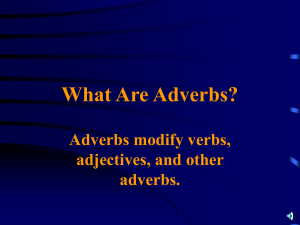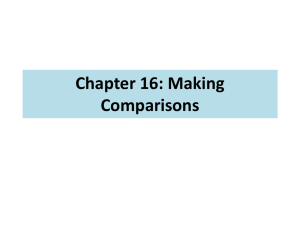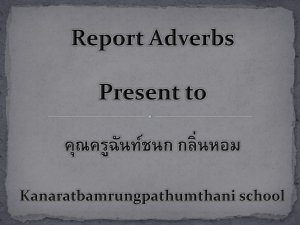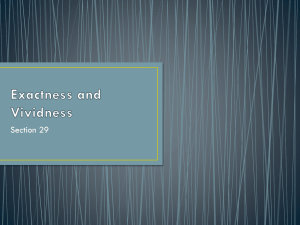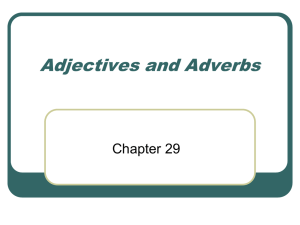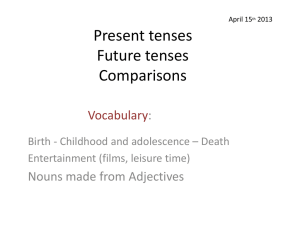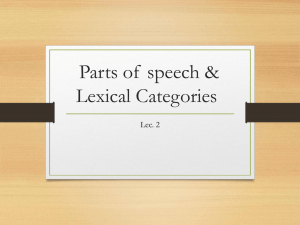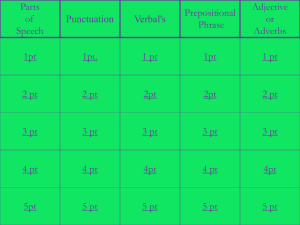Chinese Verbs
advertisement
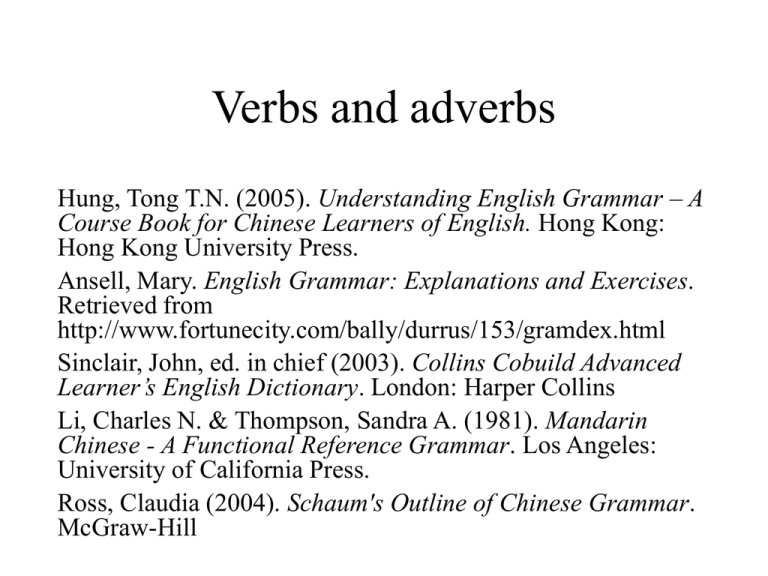
Verbs and adverbs Hung, Tong T.N. (2005). Understanding English Grammar – A Course Book for Chinese Learners of English. Hong Kong: Hong Kong University Press. Ansell, Mary. English Grammar: Explanations and Exercises. Retrieved from http://www.fortunecity.com/bally/durrus/153/gramdex.html Sinclair, John, ed. in chief (2003). Collins Cobuild Advanced Learner’s English Dictionary. London: Harper Collins Li, Charles N. & Thompson, Sandra A. (1981). Mandarin Chinese - A Functional Reference Grammar. Los Angeles: University of California Press. Ross, Claudia (2004). Schaum's Outline of Chinese Grammar. McGraw-Hill 1. Chinese Verbs 1.1 Chinese Stative Verbs • Convey states rather than actions • They take what would be considered an adjective in English and use it seemingly as a verb. • When translating stative verbs into English, one needs to add the English verb “to be” – Ni lei ma? Are you tired? – Wo hen lei. I am very tired. • The verb “to be” expresses a state of being. Therefore these kinds of Chinese verbs are called stative verbs. 1.2 Action or functive verbs • These are your normal everyday verbs expressing an action – Ni chi le ma? Have you eaten? – Wo chi le. I have eaten. – Wo xi huan kan shu. I like to read. – Wo hen xi huan ta. I really like him. – Wo ai ta. I love her. 1.3 Chinese Verbs in series • Some Chinese verbs can be listed in a series: – – – 他想去看电影。 He wants (is planning) to go see a movie. 她决定不嫁他。She decided not to marry him. 他上楼睡觉。He goes upstairs to sleep. 2. Teaching English Verbs to Chinese learners • Because Chinese does not inflect verbs, when teaching new learners, time words will be added to the sentence to help the students grasp the new concept. – He has (already) eaten breakfast. – Ta (yi jing) chi le zao fan • This results in redundancies when writing English, or worse, incorrect use of the verb. – *He already eats breakfast. Teaching verbs cont. • Chinese learners of English often have trouble speaking and writing in any tense except present tense. • How can you correct this problem? • Teach past tense first instead of present tense?? Has this been tried? • Any other suggestions? 3. Chinese adverbs • Moveable adverbs – Time – Attitude • Nonmovable adverbs – Manner – Nonmanner 3.1 The Position of Adverbs in Chinese Sentence • Adverbs in Mandarin typically occur after the subject or after the topic in a topic prominence (we will discuss this later) sentence. • 张三刚来. Zhang Three has just arrived. • 张三太高. Zhang Three is too (or extremely) tall. Position cont. • When a sentence contains both an adverb and an auxiliary verb, the adverb always precedes the auxiliary verb. • 张三一定能跳舞. • Zhangsan definitely can dance. 3.1.1 Moveable adverbs • Certain adverbs may occur both after the topic of a sentence and also in the sentence initial position, that is proceeding the topic. – Time: 今天,去年, 将来, 近来 “recently”, 现 在,下午,暂时 zanshi, 刚(刚) • 今天我不舒服 Today I am comfortable. • 我今天不舒服 *I today am comfortable. – Attitude: adverbs that denote the speaker’s attitude toward or evaluation of an event. 显然 xianran “obviously” • 显然张三不高兴 Obviously, Zhang Three is not happy. • 张三显然不高兴 *Zhang Three obviously is not happy. 3.1.2 Nonmovable adverbs • The vast majority of Chinese adverbs occur only in the position immediately following the subject or topic and before the verb. These are classified as manner adverbs and nonmanner adverbs • Manner adverbs modify the verb phrase by signaling the manner in which the action of the verb phrase is carried out. – 他快快地走。*He quickly walks. He walks quickly – 她静静的躺在草上。 He quietly lays on the grass. – 张三空手被李四制服了。Zhangsan, empty handed, was subdued by Lisi. Empty handed Zhangsan was subdued by Lisi. – 张三被李四空手制服了。Zhangsan was subdued by Lisi empty-handedly. – Zhangsan was subdued by empty-handed Lisi. • Nonmanner adverbs are adverbs that include 已经,一直,连,常,早, 也,再, 就,只,很,才,都,还,又 – – – – 我已经把作业做好了 I already have done my homework. I have already done my homework. Compare 已经 and 早已 连(甚至) • • • • • 我连一分钱都没有。 我甚至没有一分钱。 *I even don’t have one cent. *I even one cent don’t have. I don’t even have one cent. 又 and 再 • 再 refers to events that have not yet happened, whereas 又 refers to applies either to past or to present events. – 他又吃了。He is eating again. – 他昨天又吃了。*He yesterday ate again. He ate again yesterday. – 他明天再吃。He will eat again tomorrow. √ Notice here that 再 indicates future. Are there other Chinese adverbs like this? 又, 再, 就 – 他明天又要吃了。*He tomorrow again wants to eat. Again, he wants to eat tomorrow. – 他明天要再吃。*He tomorrow wants again to eat. He wants to eat again tomorrow. • 就 is a sentence linking element. – 我来了以后,他就不高兴。*I came after, he then unhappy. After I arrived, he was (became) unhappy. • It can also mean immediately, soon or only. – 我就去. I will go soon. 他就喜欢张三. He likes only Zhangsan. • The different uses of 就 are determined by the context. 只, 才 • 只 solely modifies the entire predicate phrase as does 就. It can never modify a noun phrase as “only” can in English. – 我们只要咖啡. We only want coffee. • 才 means “just now” and “only then.” – 我才到. I just arrived. – 我明天才走呢. *I tomorrow only then go. I’m not leaving until tomorrow. 都 • 都 is unique among Chinese adverbs. It can refer only to a preceding plural noun phrase, and this noun phrase is generally the topic of the subject. – 这些孩子我都喜欢. *These children, I all like. I like all of these children. – 这个孩子我们都喜欢. *This child, we all like. We all like this child. However it can sometimes be ambiguous: – 这些孩子我们都喜欢. We like all these children. We all like these children. We all like all of these children. 很 • 他很有钱. *He really have money. He is rich. • 这个人很有权. *This person very have power. This person is very powerful. • 他跑得很快. He runs very fast. 太 • 太 has two meanings depending on context: • 他吃得太快所以肚子不舒服. He ate too fast, so now his stomach is upset. • 他太高. He is extremely tall. He is too tall. • 他跑得太快. *He runs so fast. He runs very fast. • Difference? • So so Time in a Chinese Sentence • A time always appears before the verb it modifies. It may stand before or after the subject. • E.g. 我现在在看书。 I am reading now. Unlike English “now” which can appear in a variety position in a sentence, Chinese “现在” never shows up in a sentence final position. *wo kanshu xianzai *我看书现在。 Other examples • 因为很多的作业,我几乎没有时间去放 松。-• *Because of a lot of assignments, I nearly have no time to relax. • I almost never (or rarely) have time to relax because I have many assignments. There Are Five Different Types of English 1 Adverbs Adverbs of Frequency always never ever usually often seldom frequently rarely generally sometimes 2 Adverbs of Manner carefully correctly eagerly easily fast loudly patiently quickly quietly well 3 Adverbs of Location ahead back forward here high low near outside somewhere there 4 Adverbs of Time again early late now sometime then today already tomorrow tonight yesterday 5 Connecting Adverbs also consequently furthermore hence however moreover neverthel ess otherwise therefore thus Adverbs of frequency Adverbs of frequency may occupy the beginning position, the middle position, and the end position. 1. The use of this position tends to emphasize the adverb. E.g. Often the wind blows less strongly at night. 2. An adverb in the end position occurs after an intransitive verb. E.g. He speaks seldom. Adverbs of frequency occupy the middle position Depending on the type of verb used: 1) They follow the verb be. 2) They follow the have auxiliaries. 3) They precede the verbs other than the verb be. e.g. 1) We are always on time. 2) I have often wondered about that. 3) He rarely makes a mistake Adverbs in the middle position of a clause usually follow the word not. E.g. They do not often miss the bus. In affirmative questions, and negative questions with n't, adverbs in the middle position of a clause usually follow the subject of the clause. E.g. Doesn't he usually know the answers? Adverbs of manner • Adverbs of manner most often occupy the end position of a clause, where they follow an intransitive verb. e.g. We waited patiently for the play to begin. I sold the strawberries quickly. • An adverb of manner may be placed at the beginning of a clause, in order to emphasize the idea expressed by the adverb. e.g. Patiently, we waited for the show to begin. Adverbs of location • Adverbs of location, and adverb phrases and clauses of location, most often occupy the end position of a clause, where they precede adverbs of time e.g. 1)I am going there tomorrow. Adverbs of time • Adverbs of time usually occupy either the beginning position or the end position of a clause. – e.g. Today I will go to the library. I will go to the post office tomorrow. • Use already to show that something has happened before the moment you are referring to. British speakers use it with the perfect aspect putting it after has or had or at the end of a clause. Some American speakers use it with past tense. – She has already eaten. (Brit) – She has eaten already. (Brit) – I already reminded you to be on time. (Am) already2 • Further, you use already to show that a situation exists at this present moment or it exists at an earlier time than expected. – – • He was already rich when I met him *He already was rich when I met him. When you want to add emphasis, you can put already at the beginning of a sentence. – Already, he has a luxurious villa in France. Connecting adverbs • Connecting adverbs are usually placed at the beginning of a independent clause. • We wanted to go to the party after we finished our homework, therefore we did it quickly. • We need to prepare for teaching tomorrow. Furthermore, we will have a test upon our return.
